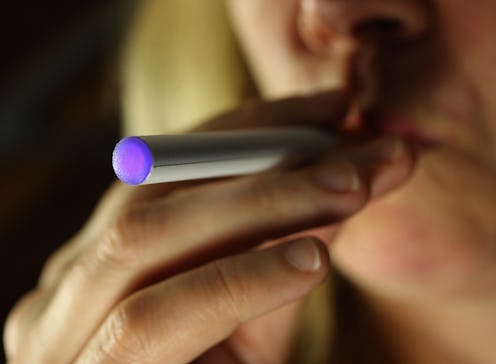
A lot of smokers turn to e-cigarettes when attempting to quit smoking, since it delivers nicotine without having to literally inhale tobacco smoke. But some critics of e-cigarettes and vapes say that these devices can pose their own risks. The recent findings that vaping is linked to breathing problems in adults, according to a study from the University of Rochester Medical Center and published in the journal Tobacco Control, highlight that vaping is not necessarily safer than smoking. In fact, the study reported that aerosols and flavorings in e-cigarettes can cause inflammation in lung tissue. So if you're vaping to quit smoking, you could do further damage to your lungs.
Researchers analyzed 28,000 adults and found that those who vaped were almost twice as likely to experience wheezing and difficulty breathing than non vapers. Dual users, people who smoked and vaped, had the highest rates of breathing problems. Because the data was self reported, it doesn't provide definitive proof that vaping causes wheezing, but it does highlight an association between the two that warrants further research.
"The take-home message is that electronic cigarettes are not safe when it comes to lung health," study author Deborah J. Ossip, Ph.D., a tobacco research expert and professor in the Department of Public Health Sciences at the University of Rochester Medical Center, said in a press release. "The changes we're seeing with vaping, both in laboratory experiments and studies of people who vape, are consistent with early signs of lung damage, which is very worrisome."
While fewer people are smoking cigarettes than in generations past, a report from the U.S. Centers for Disease Control found that use of e-cigarettes has increased by 48 percent among middle schoolers and by 78 percent among high school students. Another report from the CDC found that people who vape are more likely to smoke cigarettes in the future. In addition, because vaping is a relatively new technology, the long-term effects of the chemicals on the body are not well documented.
"People need to understand that e-cigarettes are potentially dangerous to your health," Dr. Michael Joseph Blaha, director of clinical research at the Johns Hopkins Ciccarone Center for the Prevention of Heart Disease, wrote for the Johns Hopkins Medicine Healthy Heart blog. "You’re exposing yourself to all kinds of chemicals that we don’t yet understand and that are probably not safe."
People who already have breathing problems like asthma may have a higher risk of developing adverse effects. A report published in the journal Pediatrics detailed an 18-year-old woman's experience with respiratory failure, which lead to acute respiratory distress syndrome (also known as wet lung). Doctors suspected her condition was a result of vaping. Aside from having mild asthma, the woman was otherwise healthy before being admitted to the hospital.
If you're under the impression that e-cigarettes that don't contain nicotine aren't harmful, the CDC said that's not the case. Particles can be inhaled into the lungs, and e-cigarettes contain "flavoring such as diacetyl, a chemical linked to a serious lung disease," the CDC reported.
"Some of the ingredients in e-cigarette aerosol could also be harmful to the lungs in the long-term. For example, some e-cigarette flavorings may be safe to eat but not to inhale because the gut can process more substances than the lungs."
Basically, all forms of smoking can potentially damage your lungs. Talk to your doctor about ways to quit smoking that might not involve e-cigarettes, and if you experience wheezing or difficulty breathing after using any kind of device.